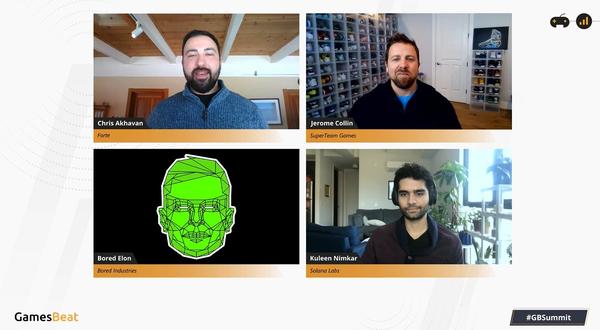Blockchain games are on the defensive lately, and resistance from hardcore gamers and game developers could reverse the progress that nonfungible tokens (NFTs) made in 2021. Only better communication will reverse this, according to a panel of blockchain game advocates.
They spoke at our GamesBeat Summit: Into the Metaverse 2 online event and mustered their best arguments for why NFT games will go mainstream. During the past year, NFTs have generated a lot of hype and wealth in markets such as art, celebrity collectibles, fashion, and comics. In games, titles such as Axie Infinity from Sky Mavis have generated excitement around play-to-earn, or the ability to make money in games by selling NFTs earned in games. NFTs used the security and transparency of the digital ledger of blockchain to uniquely identify digital items.
Advocates say that NFTs have utility for game collectibles and other items, and then enable users to earn money by investing their time in games, rather than playing only for fun. But critics have pointed out that players motivated by profits rather than fun will abandon a game more willingly. They’ve also pointed to criticisms like the environmental wastefulness of blockchain, the pump-and-dump scams associated with Ponzi-like models, and the lack of utility.
Chris Akhavan, the chief business officer of Forte, moderated the panel. Forte makes infrastructure around blockchain games to offload game publishers and developers. It raised $725 million recently to enable game devs and publishers to make the transition to NFTs. Also on the panel were Jerome Collin, CEO at SuperTeam; Kuleen Nimkar, business development officer at Solana; and online personality BoredElonMusk.
Webinar
Three top investment pros open up about what it takes to get your video game funded.
Collin said that one thing he noticed is that when people describe NFTs, someone asks what NFTs are and they’re explained as a kind of in-app purchase and a new way to spend extra money. But he notes that is what NFTs are trying to fix — the fact that when you make an in-app purchase, you don’t actually own it. You can’t take it away and sell it somewhere else. With NFTs, Collin noted that you get control over the thing that you buy.
“I think the reality for gamers is, whether they like it or not, is that in-app purchases, or microtransactions, as they tend to get called in console games or free-to-play in general, that’s not going away.
“That is the winning business model, across the board,” Collin said. “With with NFTs and crypto in general, it allows users to then, after they’ve spent all this money, and after time and effort put into this product or game, they can have these things and actually profit off them.”
He noted that free-to-play games live off the profits from whales, or those who might spend $500,000 on a single game. These people have no ownership at all, and it’s against the terms of service for them to sell their assets to someone else.
“It just seems obvious to me that gamers should love this, right?” Collin said. “They should be really excited about like, man, if I’m going to commit all this time and all this money to a game, I have a way if I’m done after six months, and I”m just done, I can recoup some value. That should get people excited, not kind of upset about it. And perhaps they don’t even trust this concept. They do truly own the assets.”

Akhavan asked if getting gamers to trust the companies is the issue.
“I agree a ton with what’s already been said,” Nimkar said. “The one additional thing I’d add is that I think it’s important to keep in mind who is potentially actually complaining. Because there’s this sense of there are people who identify themselves as gamers, who are I’d characterize generally speaking, and this is like very general characterizations, who kind of grew up playing on consoles and are used to buying a game for $50. And some of that population is very active, especially on social media forums like Reddit.”
He added, “But there’s now a ton of gamers, actually the majority of gamers, or people who don’t even identify as gamers who are playing casually when they’re commuting to work on the subway, like on their phone. And those people don’t identify as gamers. They’re not super engaged and vocal about these things. And that group is going to just do whatever is best for them. That group has no problem paying for microtransactions on phones. It’s just like what they do to enjoy the game. It gives them a good experience.”
So Nimkar believes the complaints are coming from a vocal minority.
“Some of their concerns are valid, but you don’t want to stop experimentation,” Nimkar said. “Because of that, ultimately, the onus is on game builders and the crypto industry, if you will, to prove to everyone, and the vocal minority, that this is actually good for you.”
Akhavan said we should be careful not to lump all of the three billion people who play games into a monolith, as gamers are diverse and they enjoy different play patterns. So how do you onboard them?Collin said there is a lot to be done on this front. Web 3 as a concept has been very confusing and even scary to the average Joe, he said. It’s complex and it has a lot of unknowns. There is a lot of friction that players have to get past. You have to trust in a transaction that is complicated. Things like presales of lands in virtual worlds have become common, but that requires users to set up their cryptocurrency wallets, obtain crypto, and sometimes convert currency. Akhavan said the ecosystem has to get better about educating audiences around like the projects and acknowledge that there are games that aren’t high-quality games associated with the NFTs. Audiences have to know how to pick through these features and find high-quality games.
Collin said that for blockchain games to get mass adoption, they need to be good. And so far, that hasn’t been the case, to put it gently, he said. He noted that a lot of high-quality game devs are moving into the space, and so he is optimistic about the future. He repeated the problems associated with creating wallets and understanding crypto and tokens. That’s because the liquidity for the game assets is going to exist in the crypto sphere, which is complex.
“The experience is fundamentally broken,” he said. “If we want to get into the rest of the world, I think the experience needs to look like this where it’s great.”
He said custodial wallets that can be set up more easily would be a good step.
“We just have to make that experience really easy and not scary, right? Collin said. “I still get scared every time I transfer crypto assets like, oh, did I put in the address wrong? I hope I didn’t accidentally delete something and then it’s gone, right? So we can’t screw that up. Because it’s your first experience doing this is bad. You’re just done. You lost that person. They all stop there.”
Things like tutorials have to be simpler and smoother and not overwhelming, Collin said.
BoredElonMusk said communicating with a lot of jargon doesn’t help. Words like “liquidity” or “earn” is off-putting because the focus isn’t on the play. He noted that gamers used to be able to sell their used game disks back to stores like GameStop, and that is something that was taken away with digital games. Now that right to resell games that you own is returning, as you will own the item in question.
“That’s really powerful for the player, that gives them a lot more ownership than they have today,” he said. “And I think the biggest obstacle to overcome is just to reinforce that this is not about pay to win, right? It’s not about letting you just come in with a bunch of money and buying up powerful characters. It’s giving you the right to do what you want with these digital assets that are just as important to own as physical assets.”
In other words, people think blockchain games are sketchy already. To combine them with sketchy design tactics like pay-to-win will be an even bigger turnoff. Akhavan agreed that is a point where communication could be better. Collin said driving the point of ownership home is important, and bringing up the notion of earning is happening too soon. It should be a fun first mentality, not an earning mentality.
There shouldn’t be an emphasis on the fact that the early players will benefit more as investors than the players who come along later. You don’t want the players who come later holding the bag, as that makes it all seem like a Ponzi scheme. That is a matter of proper game design and communication, Nimkar said.
“You want to communicate how great and fun your game is going to be,” Nimkar said.”The traditional marketing exercise of segmenting how you communicate to different audiences based on their underlying motivations matters.
Akhavan noted that as games become more popular, centralization takes over and decentralization is supposed to be very important in this ecosystem. Nimkar said that he thinks there will be very different views of crypto and NFTs in different parts of the world, and different blockchains will be popular in different regions.Nimkar thinks there will be some centralization over time, so rather than having 50 different blockchains, he thinks we will see similar results as we do with Steam, the Epic Games Store, iOS, and Android. Akhavan agreed, saying the Tera blockchain is very popular in the Korean gaming community, but we don’t hear about it in the Western world. BoredElonMusk believes we’ll see consolidation, similar to what we see in the traditional gaming world. And so the forces of decentralization will have challenges in NFTs as well.
“The majority will be OK with it, and they will be happy being able to exchange their assets with people on the same network,” BoredElonMusk said.
Asked how far we are from average mainstream gamers interacting with game NFTs, Collin said, “I’m having a real hard time coming up with a number of months or years. I think we’re getting closer, though, at least to the gaming community getting exposed over the next year or two.”
“This has always been a thing,” Collin said. “People have kind of sold their accounts in World of Warcraft. You have to trust the other person that they would not screw you over. That desire to interact in these ways with games has always been there.”
Nimkar said we will see a bunch of experimentation this year from well-known studios. There will also be other failed starts this year, and we will see more of it come online next year as the problems get solved.
“From the Forte perspective, we see so many talented triple-A teams forming new blockchain studios, as well as obviously the biggest game companies in the world exploring this,” Akhavan said. “I think we’re definitely bullish that mainstream gamers are going to get a good dose of really high-quality experiences coming to the space pretty soon.”
BoredElonMusk said he expects that by GDC 2023 (March 2023), you’re going to see one or two triple-A studios announcing this type gonna have at least one or two triple-A studios will announce these NFT games, on top of what we’ve already seen with Ubisoft and Square Enix.
“They have taken their criticism in stride, and are probably already course correcting and working on how they’re going to launch the news of this all happening this summer or the fall of 2022,” BoredElonMusk said. “And then next year, we’re going to get to actually try these things out.”
GamesBeat's creed when covering the game industry is "where passion meets business." What does this mean? We want to tell you how the news matters to you -- not just as a decision-maker at a game studio, but also as a fan of games. Whether you read our articles, listen to our podcasts, or watch our videos, GamesBeat will help you learn about the industry and enjoy engaging with it. Learn More









